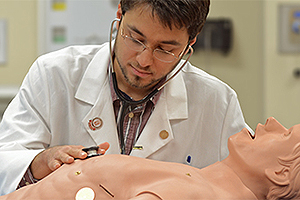El Paso Leads the Way in Clinical Simulation

Education through simulation improves future patient outcomes as students become doctors.
With a new accreditation, the Paul L. Foster School of Medicine has entered into an elite group of institutions.
The Center for Advanced Teaching and Assessment in Clinical Simulation (ATACS) at the Paul L. Foster School of Medicine is now one of only 27 simulation centers accredited by the Society for Simulation in Healthcare (SSH) and the only one in Texas. It is one of just 10 SSH-accredited simulation centers belonging to a school of medicine.
This accreditation ensures excellence in multi-specialty health care education, practice and research through simulation modalities on the El Paso campus.
“Simulation is still relatively new 15 to 20 years old,” said Hoi Ho, M.D., associate academic dean for faculty affairs and development, and director of the ATACS. “Prior to the establishment of the Society for Simulation in Healthcare, there were no standards in simulation.”
Established in 2004, the SSH represents the rapidly growing group of educators and researchers who utilize a variety of simulation techniques for education, testing and health care research.
Ho said the accreditation process began with a self-assessment of the program along with preparation of the application, which consisted of several hundred pages. Ho and his staff were tasked with proving they met or exceeded standards set by SSH, which included proof that the Paul L. Foster School of Medicine administration was dedicated to the growth and success of the center, and qualified staff were on hand to deliver teaching and training.
“This accreditation means that we mean business,” Ho said. “We are in the business of simulation and recognized for the best standards.”
Located on the third floor of the Paul L. Foster School of Medicine Medical Education Building, the 13,000-square-foot space uses advanced technology and equipment to support innovative learning methods for medical students and residents, which will ultimately translate into better patient care as students become doctors.
Through evaluation of the center, officials with the SSH recognized the ATACS for the amount of contact hours staff spent with students and the amount of heart they brought to the center.
“Each person on this team has contributed his or her best to this simulation center,” Ho said. “We don’t want to be second best. We want to be considered the leader in clinical simulation.”
Related Stories
Celebrating Veterans: TTUHSC’s General Martin Clay’s Legacy of Service and Leadership
From his initial enlistment in the Army National Guard 36 years ago to his leadership in military and civilian health care management roles, Major General Martin Clay’s career has been shaped by adaptability, mission focus and service to others.
Texas Tech University Health Sciences Center School of Nursing Named Best Accelerated Bachelor of Science in Nursing Program in Texas
The TTUHSC School of Nursing Accelerated Bachelor of Science in Nursing (BSN) program has been ranked the No. 1 accelerated nursing program in Texas by RegisteredNursing.org.
TTUHSC Names New Regional Dean for the School of Nursing
Louise Rice, DNP, RN, has been named regional dean of the TTUHSC School of Nursing on the Amarillo campus.
Recent Stories
The John Wayne Cancer Foundation Surgical Oncology Fellowship Program at Texas Tech University Health Sciences Center Announced
TTUHSC is collaborating with the John Wayne Cancer Foundation and has established the Big Cure Endowment, which supports the university’s efforts to reduce cancer incidence and increase survivability of people in rural and underserved areas.
TTUHSC Receives $1 Million Gift from Amarillo National Bank to Expand and Enhance Pediatric Care in the Panhandle
TTUHSC School of Medicine leaders accepted a $1 million philanthropic gift from Amarillo National Bank on Tuesday (Feb. 10), marking a transformational investment in pediatric care for the Texas Panhandle.
Texas Tech University Health Sciences Center Permian Basin Announces Pediatric Residency Program Gift
TTUHSC Permian Basin, along with the Permian Strategic Partnership and the Scharbauer Foundation, Feb. 5 announced a gift that will fund a new pediatric residency.
